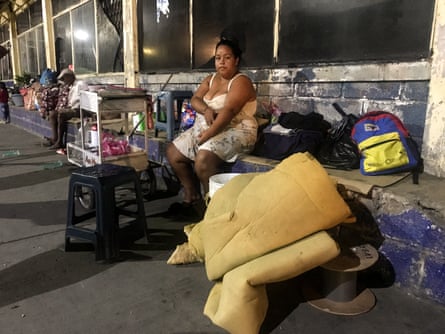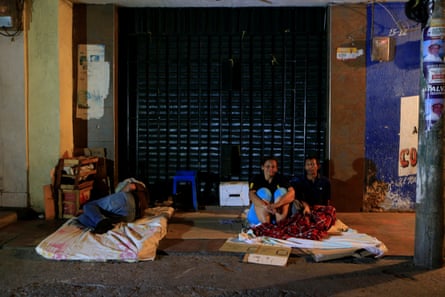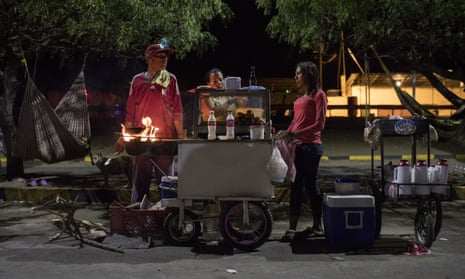Axleny Machado has slept on a piece of foam outside Maicao’s main bus terminal since she arrived from Venezuela a year ago. She’s one of thousands who live this way in the arid border city in La Guajira, northern Colombia, which is now struggling with the huge influx of migrants and refugees.
Machado, 24, has a small trolley she rents for 90p a day to sell cigarettes, coffee and sweets to commuters. If lucky, she makes about £4 a day – enough to look after herself. She wants to leave Maicao for another Colombian city and look for opportunities, but money doesn’t permit.
Since sleeping at the bus terminal, she’s been robbed of her passport, clothes and phone.

“I prefer to sleep here than in the city centre – it’s really dangerous now,” she says, sitting on a bench outside the bus station with her sister as her mother sweats over a gas stove, cooking rice.
Maicao’s streets are bursting with homeless Venezuelans taking refuge. Mothers with small children sleep on flattened-out cardboard boxes on dirty pavements. Drug use and sex work are rife and resources are scarce. The central market is one of the main areas in which they reside.
Since Venezuela’s economic collapse began under the presidency of Nicolás Maduro in 2016, violence, insecurity and a severe lack of basic food and medicine have caused more than 4 million people to flee. An estimated 1.5 million have settled in Colombia.
About 59,500 have settled in Maicao, smaller in size and with less public infrastructure than the more popular migrant entry point of Cúcuta, and it’s struggling to cope.
A UN assessment of Venezuelans’ living conditions in Maicao found almost half were living on the streets, or in informal settlements in and around the city.

A year ago, with public spaces and local infrastructure like hospitals and schools starting to collapse, the city’s mayor pleaded with the UN for help. The UN refugee agency, the UN High Commissioner for Refugees (UNHCR), opened its first camp in Colombia, giving a maximum of one month’s temporary respite to the most vulnerable.
Yolimar Ochoa, 34, was allowed six weeks in the camp. Single, pregnant and with five young children, she was sleeping on the streets. Her baby was born not long after leaving the camp, and she’s thankful to the UN and organisations like Mercy Corps who provided her with temporary cash payments for basic needs. It helped her pay for a small bedroom near the overcrowded marketplace she shares with all her children, the eldest 16, who is pregnant. None of them currently attend school.

Now her money is running out. “I don’t want to go back to the street again. There are a lot of really bad people around here,” she says, standing outside the entrance to Maicao’s cemetery where she and her five children slept on concrete for a year. “I eat small meals, basic things like plantain, and potatoes, to save money to pay rent.”
About 1,200 people have benefited from the camp, but the mayor’s office believes it has made little difference.
“The idea was to take a human being with needs and change that, so after [being in the camp] they’d have an introduction about how to be a citizen with rights and duties. That’s not happening,” says Aldemiro Santo, government secretary in Maicao’s mayor’s office. He says crime is taking over the city. “Maicao is living in tragedy on a daily basis.”
Santo says many Venezuelans who arrive do so with scant idea of how they will survive in Colombia, making them more vulnerable to crime.
Hugh Aprile, director of Mercy Corps in Colombia, says there “are simply not enough resources to help the thousands of Venezuelans who continue streaming across the border in Colombia”.
As well as the physical hardship, refugees are faced with xenophobia, moving the UNHCR to launch a campaign, Somos Panas – “We’re mates”, roughly translated – to remind Colombians of how Venezuela helped them when thousands fled the long-running civil war.
Coupled with this, a group of 220 Venezuelan volunteers have begun cleaning up the streets of Maicao and interacting with locals to show they respect the city and set an example.

“There has been a complete collapse in public space in Maicao and also issues with security – all related to the effects of migration,” says Edinson Gomez, who oversees the project, known as Banco Amable (“kind bank”). “This has brought xenophobia with it.”
Gomez says the project has been well received by locals and “allows them to see Venezuelans in a different way”.

Edgar Alexander Gomez, 50, a volunteer, says: “It changes the way Colombians think of us – we’re not all bad.” Gomez arrived seven months ago with his sister Maria, 54, who also volunteers. Between them, they taken a host of short and informal jobs to keep them afloat in Maicao.
The migration crisis has also led to more gang violence in Maicao, as rival groups vie for control of the lucrative petrol market.
For decades criminal groups from Venezuela and Colombia have taken advantage of the porous border to smuggle petrol across the border, says Gimena Sánchez-Garzoli of the Washington Office on Latin America thinktank.
“These groups often have diverse operations happening at once, including arms, drugs, migrants and smuggling goods,” says Sánchez-Garzoli. “They often fight over territory, are violent and corrupt locals to look the other way, or assist in their operations. If public forces pursue them, they conveniently escape to the other side.”
Extortions and kidnappings have also been on the rise. Local media is flooded with reports of local business owners being extorted and kidnapped, to pay money to criminal groups. Many public officials and NGOs interviewed were hesitant to comment on these issues.
The mayor’s office says locals are “fed up” with the violence, increase in drugs now available in the city, and rising sex work among the migrant population.
Andrea, 19, fled Venezuela’s Margarita Island two years ago. She has a four-year old child.
“When you work as a prostitute on the street, it’s dangerous, but really dangerous here [in Maicao],” she says.

A group of refugee transgender sex workers were forced to flee Maicao because of alleged attacks by local officials. The Guardian has seen photos of trans women who had been attacked and had their heads shaved, allegedly by Maicao police.
“The people of Maicao aren’t ready for people like that,” says Santo when questioned about the incident. He denies any police brutality. “This sexual freedom of expression … people need time to be able to accept them.”
Tensions are likely to be exacerbated as the crisis in Venezuela deepens. Colombia’s foreign ministry estimates that another 1.3 million Venezuelans will cross the border by next year.
But Gomez remains positive. “I am going to look for a better life here, but I am not losing hope of returning to my country,” he says.
